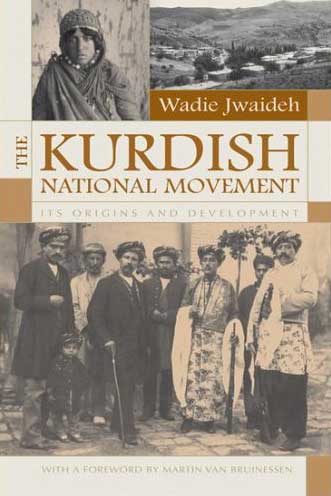
“A seminal work in the field of Kurdish studies, Wadie Jwaideh’s pioneering reasearch, published for the first time presents a detailed analysis of the early phases of Kurdish nationalism and offers a framework within which to understand the movement’s later development.
Following Wadie Jwaideh’s dissertation defense, his doctoral chairman took aside Jwaideh’s wife, Alice, and asked her to submit the work for publication without Wadie’s permission, believing that Wadie’s penchant for perfection would postpone its publication indefinitely. The thesis was never published during Jwaideh’s lifetime, but tis fame spread by word of mouth, and many scholars have recognized its importance not only as a study of the earlier period of Kurdish nationalism but laso as a model for understanding its subsequent history. the work now stands as a classic, referenced by some of the most renowned scholars in the field. Its publication will permit it to reach a greater audience and to contribute more fully to the understanding and appreciation of this geopolitcal and cultural movement.
Jwaideh was borned in the southern Iraqi city of Basra, into an Arabic-speaking Christian family that later moved to Baghdad. His inimate knowledge of the land and its people gave Jwaideh shrewd insight into Kurdish society and politics. Exploring the rich historical roots of the Kurdish national movement, he challenges the established view of the early Kurdish uprising as isolated incidents triggered by economic hardship or political dissatisfaction. Instead he offers a new interpretation of the Kurds’ nationalist position, convincigly demonstrating the age and depth of their grievances. This complex and layered history of the Kurdish national movement offers a valuable perspective from which to view the current conditions in Iraq. Jwaideh’s sensitive and prescient treatment of this region gives his study great contemporary relevance.”
Contents :
Forewords, Martin van Bruinessen
1. Geographical, cultural and historical background
2. The social organization of the Kurds
3. The suppression of the semiautonomous regimes in Kurdistan
4. Shaykh ‘Ubayd Allah of Nehri
5. The impact of the Young Turk Revolution on Kurdish nationalism
6. Russia’s Kurdish policy
7. The Kurds and World War I
8.The situation of the Kurds in Turkey, Persia and Syria after World War I
9. Disturbances in the Mosul and Arbil divisions of Iraqi Kurdistan
10. Shaykh Mahmud and the rise and fall of the South Kurdish Confederation in Iraqi Kurdistan after WWI
11. Shaykh Mahmud’s second rebellion
12. The Kurdish rebellions in Turkey
13. The Barzani rebellion of 1931-1932
14. The Barzani rebellion of Mulla Mustafa, 1943-1945, and the growth of Kurdish political organization
15. The Kurdish republic of Mahabad
16. The Kurds and the Kurdish question after the fall of Mahabad
Conclusion
Appendix, etc.
First paragraphs:
” The Kurds, a gifted and vigorous people, have played an important role in Middle-Eastern history. They have produced men of outstanding qualities as soldiers, statesmen, administrators, and scholars, and have enriched the life and culture of the Islamic countries of the Middle-East. Next to the Arabs, the Turks, and the Persians, they constitute the most numerous ethnic group in western Asia. A bellicose and still largely untamed people, they have been often compared to the seventeeth-century clans of Scotland. Despite their pride of race as individuals, they have until comparatively recent times been content as a people to play a subsidiary role among their more numerous and better organized neighbors.”
